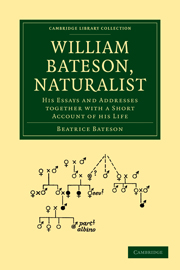Book contents
- Frontmatter
- Contents
- MEMOIR
- Hybridisation and Cross-breeding as a Method of Scientific Investigation
- Problems of Heredity as a subject for Horticultural Investigation
- An Address on Mendelian Heredity and its application to Man. Delivered before the Neurological Society, London, I. ii. 1906
- Gamete and Zygote. A Lay Discourse. The Henry Sidgwick Memorial Lecture, 1917
- Heredity and Variation in Modern Lights
- Presidential Address to the Zoological Section, British Association: Cambridge Meeting, 1904
- Presidential Address to the Agricultural Subsection, British Association: Portsmouth Meeting, 1911
- Presidential Address to the British Association, Australia: (a) Melbourne Meeting, 1914. (b) Sydney Meeting, 1914
- The Methods and Scope of Genetics. Inaugural Lecture delivered 23 October 1908. Cambridge
- Biological Fact and the Structure of Society. The Herbert Spencer Lecture, 28 February 1912. Oxford
- Science and Nationality. Presidential Address delivered at the Inaugural Meeting of the Yorkshire Science Association
- Common-sense in Racial Problems. The Galton Lecture
- Evolutionary Faith and Modern Doubts. Address to American Association for the Advancement of Science. Toronto, 1922
- Progress in Biology. An Address delivered March 12, 1924, on the occasion of the Centenary of Birkbeck College, London
- EDUCATIONAL ESSAYS
- REVIEWS
- APPENDIX
- INDEX OF PERSONS
- INDEX OF SUBJECTS
- PLATES I-III (Figs. 1-6) to Mendelian Heredity and its application to Man
Presidential Address to the Zoological Section, British Association: Cambridge Meeting, 1904
Published online by Cambridge University Press: 07 September 2010
- Frontmatter
- Contents
- MEMOIR
- Hybridisation and Cross-breeding as a Method of Scientific Investigation
- Problems of Heredity as a subject for Horticultural Investigation
- An Address on Mendelian Heredity and its application to Man. Delivered before the Neurological Society, London, I. ii. 1906
- Gamete and Zygote. A Lay Discourse. The Henry Sidgwick Memorial Lecture, 1917
- Heredity and Variation in Modern Lights
- Presidential Address to the Zoological Section, British Association: Cambridge Meeting, 1904
- Presidential Address to the Agricultural Subsection, British Association: Portsmouth Meeting, 1911
- Presidential Address to the British Association, Australia: (a) Melbourne Meeting, 1914. (b) Sydney Meeting, 1914
- The Methods and Scope of Genetics. Inaugural Lecture delivered 23 October 1908. Cambridge
- Biological Fact and the Structure of Society. The Herbert Spencer Lecture, 28 February 1912. Oxford
- Science and Nationality. Presidential Address delivered at the Inaugural Meeting of the Yorkshire Science Association
- Common-sense in Racial Problems. The Galton Lecture
- Evolutionary Faith and Modern Doubts. Address to American Association for the Advancement of Science. Toronto, 1922
- Progress in Biology. An Address delivered March 12, 1924, on the occasion of the Centenary of Birkbeck College, London
- EDUCATIONAL ESSAYS
- REVIEWS
- APPENDIX
- INDEX OF PERSONS
- INDEX OF SUBJECTS
- PLATES I-III (Figs. 1-6) to Mendelian Heredity and its application to Man
Summary
In choosing a subject for this Address I have availed myself of the kindly usage which permits a sectional president to divert the attention of his hearers into those lines of inquiry which he himself is accustomed to pursue. Nevertheless, in taking the facts of breeding for my theme, I am sensible that this privilege is subjected to a certain strain.
Heredity—and Variation too—are matters of which no naturalist likes to admit himself entirely careless. Everyone knows that, somewhere hidden among the phenomena denoted by these terms, there must be principles which, in ways untraced, are ordering the destinies of living things. Experiments in Heredity have thus, as I am told, a universal fascination. All are willing to offer an outward deference to these studies. The limits of that homage, however, are soon reached, and, though all profess interest, few are impelled to make even the moderate mental effort needed to apprehend what has been already done. It is understood that Heredity is an important mystery, and Variation another mystery. The naturalist, the breeder, the horticulturist, the sociologist, man of science and man of practice alike, has daily occasion to make and to act on assumptions as to Heredity and Variation, but many seem well content that such phenomena should remain for ever mysterious.
The position of these studies is unique. At once fashionable and neglected, nominally the central common ground of botany and zoology, of morphology and physiology, belonging specially to neither, this area is thinly tenanted.
- Type
- Chapter
- Information
- William Bateson, NaturalistHis Essays and Addresses Together with a Short Account of His Life, pp. 233 - 259Publisher: Cambridge University PressPrint publication year: 2009First published in: 1928



